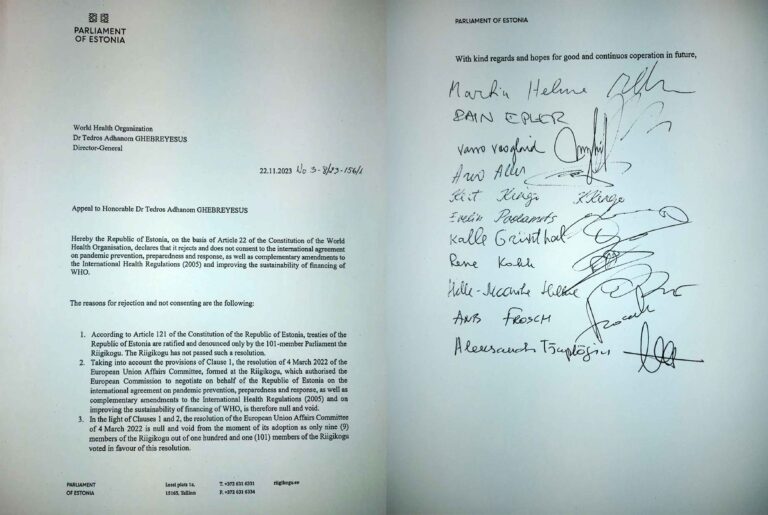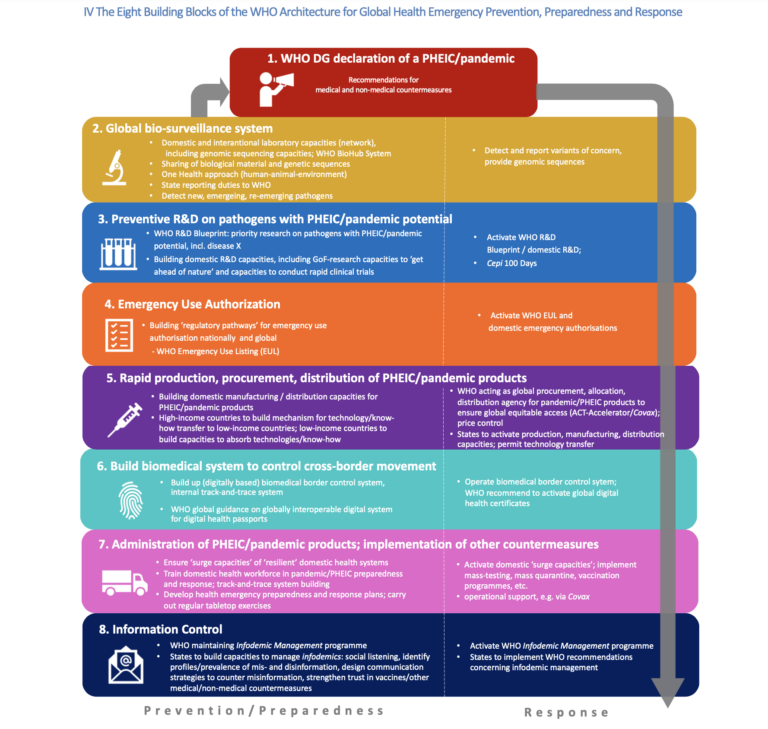This article is a repost with the permission from Brownstone Institute
The Director General (DG) of the World Health Organization (WHO) states:
No country will cede any sovereignty to WHO,
referring to the WHO’s new pandemic agreement and proposed amendments to the International Health Regulations (IHR), currently being negotiated. His statements are clear and unequivocal, and wholly inconsistent with the texts he is referring to.
A rational examination of the texts in question shows that:
- The documents propose a transfer of decision-making power to the WHO regarding basic aspects of societal function, which countries undertake to enact.
- The WHO DG will have sole authority to decide when and where they are applied.
- The proposals are intended to be binding under international law.
Continued claims that sovereignty is not lost, echoed by politicians and media, therefore raise important questions concerning motivations, competence, and ethics.
The intent of the texts is a transfer of decision-making currently vested in Nations and individuals to the WHO, when its DG decides that there is a threat of a significant disease outbreak or other health emergency likely to cross multiple national borders. It is unusual for Nations to undertake to follow external entities regarding the basic rights and healthcare of their citizens, more so when this has major economic and geopolitical implications.
The question of whether sovereignty is indeed being transferred, and the legal status of such an agreement, is therefore of vital importance, particularly to the legislators of democratic States. They have an absolute duty to be sure of their ground. We systematically examine that ground here.
The Proposed IHR Amendments and Sovereignty in Health Decision-Making
Amending the 2005 IHR may be a straightforward way to quickly deploy and enforce “new normal” health control measures. The current text applies to virtually the entire global population, counting 196 States Parties including all 194 WHO Member States. Approval may or may not require a formal vote of the World Health Assembly (WHA), as the recent 2022 amendment was adopted through consensus. If the same approval mechanism is to be used in May 2024, many countries and the public may remain unaware of the broad scope of the new text and its implications to national and individual sovereignty.
The IHR are a set of recommendations under a treaty process that has force under international law. They seek to provide the WHO with some moral authority to coordinate and lead responses when an international health emergency, such as pandemic, occurs. Most are non-binding, and these contain very specific examples of measures that the WHO can recommend, including (Article 18):
- require medical examinations;
- review proof of vaccination or other prophylaxis;
- require vaccination or other prophylaxis;
- place suspect persons under public health observation;
- implement quarantine or other health measures for suspect persons;
- implement isolation and treatment where necessary of affected persons;
- implement tracing of contacts of suspect or affected persons;
- refuse entry of suspect and affected persons;
- refuse entry of unaffected persons to affected areas; and
- implement exit screening and/or restrictions on persons from affected areas.
These measures, when implemented together, are generally referred to since early 2020 as ‘lockdowns’ and ‘mandates.’ ‘Lockdown’ was previously a term reserved for people incarcerated as criminals, as it removes basic universally accepted human rights and such measures were considered by the WHO to be detrimental to public health. However, since 2020 it has become the default standard for public health authorities to manage epidemics, despite its contradictions to multiple stipulations of the Universal Declaration of Human Rights (UDHR):
- Everyone is entitled to all the rights and freedoms set forth in this Declaration, without distinction of any kind including no arbitrary detention (Article 9).
- No one shall be subjected to arbitrary interference with his privacy, family, home or correspondence (Article 12).
- Everyone has the right to freedom of movement and residence within the borders of each state, and Everyone has the right to leave any country, including his own, and to return to his country (Article 13).
- Everyone has the right to freedom of opinion and expression; this right includes freedom to hold opinions without interference and to seek, receive and impart information and ideas through any media and regardless of frontiers (Article 19).
- Everyone has the right to freedom of peaceful assembly and association (Article 20).
- The will of the people shall be the basis of the authority of government (Article 21).
- Everyone has the right to work (Article 23).
- Everyone has the right to education (Article 26).
- Everyone is entitled to a social and international order in which the rights and freedoms set forth in this Declaration can be fully realized (Article 28).
- Nothing in this Declaration may be interpreted as implying for any State, group or person any right to engage in any activity or to perform any act aimed at the destruction of any of the rights and freedoms set forth herein (Article 30).
These UDHR stipulations are the basis of the modern concept of individual sovereignty, and the relationship between authorities and their populations. Considered the highest codification of the rights and freedoms of individuals in the 20th century, they may soon be dismantled behind closed doors in a meeting room in Geneva.
The proposed amendments will change the “recommendations” of the current document to requirements through three mechanisms on
- Removing the term ‘non-binding’ (Article 1),
- Inserting the phrase that Member States will “undertake to follow WHO’s recommendations” and recognize WHO, not as an organization under the control of countries, but as the “coordinating authority” (New Article 13A).
States Parties recognize WHO as the guidance and coordinating authority of international public health response during public health Emergency of International Concern and undertake to follow WHO’s recommendations in their international public health response.
As Article 18 makes clear above, these include multiple actions directly restricting individual liberty. If transfer of decision-making power (sovereignty) is not intended here, then the current status of the IHR as ‘recommendations’ could remain and countries would not be undertaking to follow the WHO’s requirements.
- States Parties undertake to enact what previously were merely recommendations, without delay, including requirements of WHO regarding non-State entities under their jurisdiction (Article 42):
Health measures taken pursuant to these Regulations, including the recommendations made under Articles 15 and 16, shall be initiated and completed without delay by all State Parties and applied in a transparent, equitable and non-discriminatory manner. State Parties shall also take measures to ensure Non-State Actors operating in their respective territories comply with such measures.
Articles 15 and 16 mentioned here allow the WHO to require a State to provide resources “health products, technologies, and know-how,” and to allow the WHO to deploy personnel into the country (i.e., have control over entry across national borders for those they choose). They also repeat the requirement for the country to require the implementation of medical countermeasures (e.g., testing, vaccines, quarantine) on their population where WHO demands it.
Of note, the proposed Article 1 amendment (removing ‘non-binding’) is actually redundant if New Article 13A and/or the changes in Article 42 remain. This can (and likely will) be removed from the final text, giving an appearance of compromise without changing the transfer of sovereignty.
All of the public health measures in Article 18, and additional ones such as limiting freedom of speech to reduce public exposure to alternative viewpoints (Annex 1, New 5 (e); “…counter misinformation and disinformation”) clash directly with the UDHR. Although freedom of speech is currently the exclusive purview of national authorities and its restriction is generally seen as negative and abusive, United Nations institutions, including the WHO, have been advocating for censoring unofficial views in order to protect what they call “information integrity.”
It seems outrageous from a human rights perspective that the amendments will enable the WHO to dictate countries to require individual medical examinations and vaccinations whenever it declares a pandemic. While the Nuremberg Code and Declaration of Helsinki refer specifically to human experimentation (e.g. clinical trials of vaccines) and the Universal Declaration on Bioethics and Human Rights also to the provider-patient relationship, they can reasonably be extended to public health measures that impose restrictions or changes to human behavior, and specifically to any measures requiring injection, medication, or medical examination which involve a direct provider-person interaction.
If vaccines or drugs are still under trial or not fully tested, then the issue of being the subject of an experiment is also real. There is a clear intent to employ the CEPI ‘100 day’ vaccine program, which by definition cannot complete meaningful safety or efficacy trials within that time span.
Forced examination or medication, outside of a situation where the recipient is clearly not mentally competent to comply or reject when provided with information, is unethical. Requiring compliance in order to access what are considered basic human rights under the UDHR would constitute coercion. If this does not fit the WHO’s definition of infringement on individual sovereignty, and on national sovereignty, then the DG and his supporters need to publicly explain what definition they are using.
The Proposed WHO Pandemic Agreement as a Tool to Manage Transfer of Sovereignty
The proposed pandemic agreement will set humanity in a new era strangely organized around pandemics: pre-pandemic, pandemic, and inter-pandemic. A new governance structure under WHO auspices will oversee the IHR amendments and related initiatives. It will rely on new funding requirements, including the WHO’s ability to demand additional funding and materials from countries and to run a supply network to support its work in health emergencies (Article 12):
In the event of a pandemic, real-time access by WHO to a minimum of 20% (10% as a donation and 10% at affordable prices to WHO) of the production of safe, efficacious and effective pandemic-related products for distribution based on public health risks and needs, with the understanding that each Party that has manufacturing facilities that produce pandemic-related products in its jurisdiction shall take all necessary steps to facilitate the export of such pandemic-related products, in accordance with timetables to be agreed between WHO and manufacturers.
And Article 20 (1):
…provide support and assistance to other Parties, upon request, to facilitate the containment of spill-over at the source.
The entire structure will be financed by a new funding stream separate from current WHO funding – an additional requirement on taxpayers over current national commitments (Article 20 (2)). The funding will also include an endowment of voluntary contributions of “all relevant sectors that benefit from international work to strengthen pandemic preparation, preparedness and response” and donations from philanthropic organizations (Article 20 (2)b).
Currently, countries decide on foreign aid on the basis of national priorities, apart from limited funding that they have agreed to allocate to organizations such as WHO under existing obligations or treaties. The proposed agreement is remarkable not just in greatly increasing the amount countries must give as treaty requirements, but in setting up a parallel funding structure disconnected from other disease priorities (quite the opposite of previous ideas on integration in health financing). It also gives power to an external group, not directly accountable, to demand or acquire further resources whenever it deems necessary.
In a further encroachment into what is normally within the legal jurisdiction of Nation States, the agreement will require countries to establish (Article 15) “…, no-fault vaccine injury compensation mechanism(s),…”, consecrating effective immunity for pharmaceutical companies for harm to citizens resulting from use of products that the WHO recommends under an emergency use authorization, or indeed requires countries to mandate onto their citizens.
As is becoming increasingly acceptable for those in power, ratifying countries will agree to limit the right of their public to voice opposition to the WHO’s measures and claims regarding such an emergency (Article 18):
…and combat false, misleading, misinformation or disinformation, including through effective international collaboration and cooperation…
As we have seen during the Covid-19 response, the definition of misleading information can be dependent on political or commercial expediency, including factual information on vaccine efficacy and safety and orthodox immunology that could impair the sale of health commodities. This is why open democracies put such emphasis on defending free speech, even at the risk of sometimes being misleading. In signing on to this agreement, governments will be agreeing to abrogate that principle regarding their own citizens when instructed by the WHO.
The scope of this proposed agreement (and the IHR amendments) is broader than pandemics, greatly expanding the scope under which a transfer of decision-making powers can be demanded. Other environmental threats to health, such as changes in climate, can be declared emergencies at the DG’s discretion, if broad definitions of ‘One Health’ are adopted as recommended.
It is difficult to think of another international instrument where such powers over national resources are passed to an unelected external organization, and it is even more challenging to envision how this is seen as anything other than a loss of sovereignty. The only justification for this claim would appear to be if the draft agreement is to be signed on the basis of deceit – that there is no intention to treat it other than as an irrelevant piece of paper or something that should only apply to less powerful States (i.e. a colonialist tool).
Will the IHR Amendments and the Proposed Pandemic Agreement be Legally Binding?
Both texts are intended to be legally binding. The IHR already has such status, so the impact of the proposed changes on the need for new acceptance by countries are complicated national jurisdictional issues. There is a current mechanism for rejection of new amendments. However, unless a high number of countries will actively voice their oppositions and rejections, the adoption of the current published version dated February 2023 will likely lead to a future shadowed by the permanent risks of the WHO’s lockdown and lockstep dictates.
The proposed pandemic agreement is also clearly intended to be legally binding. WHO discusses this issue on the website of the International Negotiating Body (INB) that is working on the text. The same legally binding intent is specifically stated by the G20 Bali Leaders Declaration in 2022:
repeated in the 2023 G20 New Delhi Leaders Declaration:
…an ambitious, legally binding WHO convention, agreement or other international instruments on pandemic PPR (WHO CA+) by May 2024,
and by the Council of the European Union:
A convention, agreement or other international instrument is legally binding under international Law. An agreement on pandemic prevention, preparedness and response adopted under the World Health Organization (WHO) would enable countries around the globe to strengthen national, regional and global capacities and resilience to future pandemics.
The IHR already has standing under international law.
While seeking such status, WHO officials who previously described the proposed agreement as a ‘treaty” are now insisting neither instrument impacts sovereignty. The implication that it is States’ representatives at the WHA that will agree to the transfer, rather than the WHO, is a nuance irrelevant to its claims regarding their subsequent effect.
The WHO’s position raises a real question of whether its leadership is truly ignorant of what is proposed, or is actively seeking to mislead countries and the public in order to increase the probability of acceptance. The latest version dated 30 October 2023 requires 40 ratifications for the future agreement to enter into force, after a two-thirds vote in favor within the WHA. Opposition by a considerable number of countries will therefore be needed to derail this project. As it is backed by powerful governments and institutions, financial mechanisms including IMF and World Bank instruments and bilateral aids are likely to make opposition from lower-income countries difficult to sustain.
The Implications of Ignoring the Issue of Sovereignty
The relevant question regarding these two WHO instruments should really be not whether sovereignty is threatened, but why any sovereignty would be forfeited by democratic States to an organization that is (i) significantly privately funded and bound to obey the dictates of corporations and self-proclaimed philanthropists and (ii) jointly governed by Member States, half of which don’t even claim to be open representative democracies.
If it is indeed true that sovereignty is being knowingly forfeited by governments without the knowledge and consent of their peoples, and based on false claims from governments and the WHO, then the implications are extremely serious. It would imply that leaders were working directly against their peoples’ or national interest, and in support of external interests. Most countries have specific fundamental laws dealing with such practice. So, it is really important for those defending these projects to either explain their definitions of sovereignty and democratic process, or explicitly seek informed public consent.
The other question to be asked is why public health authorities and media are repeating the WHO’s assurances of the benign nature of the pandemic instruments. It asserts that claims of reduced sovereignty are ‘misinformation’ or ‘disinformation,’ which they assert elsewhere are major killers of humankind. While such claims are somewhat ludicrous and appear intended to denigrate dissenters, the WHO is clearly guilty of that which it claims is such a crime. If its leadership cannot demonstrate how its claims regarding these pandemic instruments are not deliberately misleading, its leadership would appear ethically compelled to resign.
The Need for Clarification
The WHO lists three major pandemics in the past century – influenza outbreaks in the late 1950s and 1960s, and the Covid-19 pandemic. The first two killed less than die each year today from tuberculosis, whilst the reported deaths from Covid-19 never reached the level of cancer or cardiovascular disease and remained almost irrelevant in low-income countries compared to endemic infectious diseases including tuberculosis, malaria, and HIV/AIDs.
No other non-influenza outbreak recorded by the WHO that fits the definition of a pandemic (e.g., rapid spread across international borders for a limited time of a pathogen not normally causing significant harm) has caused greater mortality in total than a few days of tuberculosis (about 4,000/day) or more life-years lost than a few days of malaria (about 1,500 children under 5 years old every day).
So, if it is indeed the case that our authorities and their supporters within the public health community consider that powers currently vested within national jurisdictions should be given over to external bodies on the basis of this level of recorded harm, it would be best to have a public conversation as to whether this is sufficient basis for abandoning democratic ideals in favor of a more fascist or otherwise authoritarian approach. We are, after all, talking about restricting basic human rights essential for a democracy to function.








